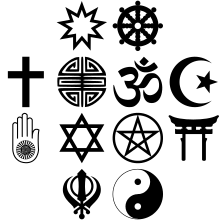 Tiene sentido afirmar que la libertad religiosa es
Tiene sentido afirmar que la libertad religiosa es
la prueba de fuego que determina la existencia
de una democracia real. Los derechos al voto, a la propiedad
o a la libre asociación tendrían muy poco significado
si los ciudadanos no pudieran expresarse y actuar democráticamente
sobre la base de sus creencias en la realidad definitiva superior
que defina quiénes son y lo que significa su existencia en esta Tierra
En la versión en español de la Wikipedia definen la libertad religiosa o la "libertad de culto" como "un derecho fundamental que se refiere a la opción de cada ser humano de elegir libremente su religión, de no elegir ninguna, o de no creer o validar la existencia de un Dios y poder ejercer dicha creencia públicamente, sin ser víctima de opresión, discriminación o intento de cambiarla." En inglés le dan un significado ligeramente distinto, pero más preciso para una interpretación jurídica, describiéndola como "un principio que apoya la libertad de un individuo o comunidad, en público o en privado, a profesar una religión o creencia en la enseñanza, la práctica, el culto y la observancia; el concepto reconoce generalmente que también incluye la libertad de cambiar de religión o de no seguir ninguna religión."
El Artículo 18 de la Declaración Universal de los Derechos Humanos establece que: "Toda persona tiene derecho a la libertad de pensamiento, de conciencia y de religión; este derecho incluye la libertad de cambiar de religión o de creencia, así como la libertad de manifestar su religión o su creencia, individual y colectivamente, tanto en público como en privado, por la enseñanza, la práctica, el culto y la observancia".
El Pacto Internacional de Derechos Civiles y Políticos proclamó 28 años más tarde en su Artículo 2 que: "Cada uno de los Estados Partes en el presente Pacto se compromete a respetar y a garantizar a todos los individuos que se encuentren en su territorio y estén sujetos a su jurisdicción los derechos reconocidos en el presente Pacto, sin distinción alguna de raza, color, sexo, idioma, religión, opinión política o de otra índole, origen nacional o social, posición económica, nacimiento o cualquier otra condición social." En su Artículo 18, va más allá para establecer que: "Toda persona tiene derecho a la libertad de pensamiento, de conciencia y de religión; este derecho incluye la libertad de tener o de adoptar la religión o las creencias de su elección, así como la libertad de manifestar su religión o sus creencias, individual o colectivamente, tanto en público como en privado, mediante el culto, la celebración de los ritos, las prácticas y la enseñanza"; pero añade que: "La libertad de manifestar la propia religión o las propias creencias estará sujeta únicamente a las limitaciones prescritas por la ley que sean necesarias para proteger la seguridad, el orden, la salud o la moral públicos, o los derechos y libertades fundamentales de los demás".
Esta Declaración y el Pacto correspondiente no se habrían podido aplicar a nivel nacional e internacional sin el Protocolo Facultativo del Pacto Internacional de Derechos Civiles y Políticos que entró en vigor el 23 de marzo de 1976 y que reconoce la competencia de un Comité de Derechos Humanos de las Naciones Unidas "para recibir y considerar comunicaciones de individuos que se hallen bajo la jurisdicción de ese Estado y que aleguen ser víctimas de una violación, por ese Estado Parte, de cualquiera de los derechos enunciados en el Pacto", con la obligación de que este Comité presente informes periódicos a la Comisión de Derechos Humanos para que ésta tome las medidas pertinentes.
 Tiene sentido afirmar que la libertad religiosa es
Tiene sentido afirmar que la libertad religiosa es Feb. 13.─ No sooner had Cuban President Raúl Castro returned to Havana from Chile, where he was sworn in as the new president of the Comunidad de Estados Latinoamericanos y Caribeños (Community of Latin American and Caribbean States—CELAC), than Reporters Sans Frontieres (Reporters Without Borders—RSF) repeated his own words back to him. The French-based NGO released a letter Monday urging the Cuban leader to release journalists currently held in Cuban prisons and called on Castro to reject, in Cuba, the "aggression, threats and use of force" he mentioned during his CELAC acceptance speech.
Feb. 13.─ No sooner had Cuban President Raúl Castro returned to Havana from Chile, where he was sworn in as the new president of the Comunidad de Estados Latinoamericanos y Caribeños (Community of Latin American and Caribbean States—CELAC), than Reporters Sans Frontieres (Reporters Without Borders—RSF) repeated his own words back to him. The French-based NGO released a letter Monday urging the Cuban leader to release journalists currently held in Cuban prisons and called on Castro to reject, in Cuba, the "aggression, threats and use of force" he mentioned during his CELAC acceptance speech.
